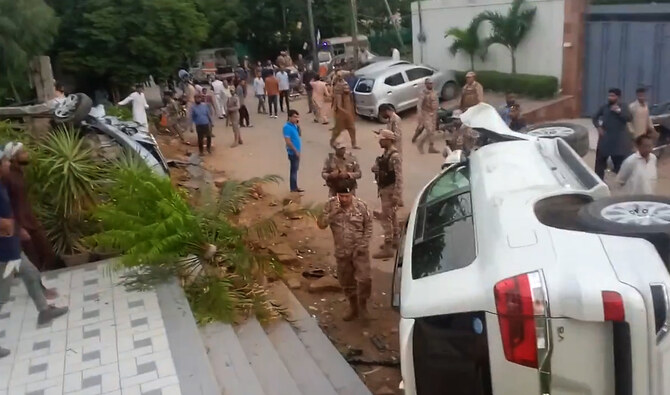KARACHI: Police in Pakistan’s southern port city of Karachi faced intense social media backlash on Tuesday after the main suspect in a high-profile hit-and-run case that claimed two lives the previous day was not brought to court, with her lawyer citing a psychiatric report declaring her mentally unfit.
CCTV footage of the accident was widely circulated on social media, showing a Toyota Land Cruiser allegedly driven by Natasha Iqbal, the wife of well-known businessman Danish Iqbal, hitting a motorbike from behind, resulting in the death of a female student and her father. Five others were also injured in the incident.
The vehicle’s alleged driver is the CEO of Metro Capital (Private) Limited and JSDN Electric Limited, two companies owned by her husband under the Metro Power business group.
The incident sparked outrage on social media, with many accusing the police of giving preferential treatment to the wealthy.
“Until the distinction between the elite and the common public is eliminated in the eyes of law enforcement agencies and responsible individuals, the rule of law will remain a dream, and the common people will continue to die unjustly on the streets,” a local lawyer, Barrister Usman Cheema, said in a social media post after sharing the details of the case. “Fear the time when the public, fed up with this oppression and unjust discrimination, is forced to take the law into their own hands.”
A social media influencer, Rabi Pirzada, said on X, formerly Twitter, she was certain the woman driving the vehicle would not be punished.
“Only the underprivileged are punished in the Islamic Republic of Pakistan,” she added.
Following the arrest of Natasha Iqbal, she was taken for medio-legal examination at the Jinnah Hospital to determine if she was under the influence of drugs at the time of the accident.
Subsequently, she was also sent to the psychiatry ward for further evaluation.
Her lawyer, Amir Mansoob, presented a police report in court that included a doctor’s note saying the suspect was “confused and not in a good state of mind.”
He claimed she had been under psychiatric treatment for five years, adding, “such patients are kept in an isolation ward and do not remember anything.”
Following the submission of the doctor’s report, the police did not produce the suspect in court.
However, a source familiar with the case alleged the police and health officials were involved in “a cover-up,” as the blood and urine samples had not been submitted for analysis to the laboratory despite a delay of more than 24 hours. The source suggested the delay could negatively impact the test results, supporting the defense’s claim that she was mentally unwell.
Senior Superintendent of Police (SSP) Investigation Aleena Rajpar confirmed the samples had not been dispatched further, informing that they would be sent for analysis on Wednesday morning.
She attributed the delay to a public holiday in Sindh province, marking the birth anniversary of Sufi saint Shah Abdul Latif Bhitai, adding, “The police are proceeding according to the law and merit. The lab was closed today, but the samples will be submitted tomorrow.”
Karachi Police Chief Javed Alam Odho, however, said it was not the police’s responsibility to submit the samples to the lab, noting that the hospital was responsible for this task.
Odho also said the police had taken the accused for a medico-legal examination on Monday night.
Meanwhile, Deputy Executive Director of Jinnah Hospital Dr. Yahya Tunio denied the police chief’s assertion.
“We don’t deal with medico-legal cases,” he told Arab News. “The police surgeon takes care of them. It’s their responsibility to collect, send and secure the sample.”
Dr. Summaiya Syed Tariq, the police surgeon, confirmed her department had collected the urine and blood samples of the accused, adding they had been handed over to the investigation officer.
“The lady was brought to us under police custody to rule out intoxication,” she said, noting that she was “very aggressive at the time of examination” and was referred to the Department of Psychiatry for emergency treatment.
“Blood and urine samples were handed over to the investigation officer,” she said, a claim which the SSP had also confirmed.


















